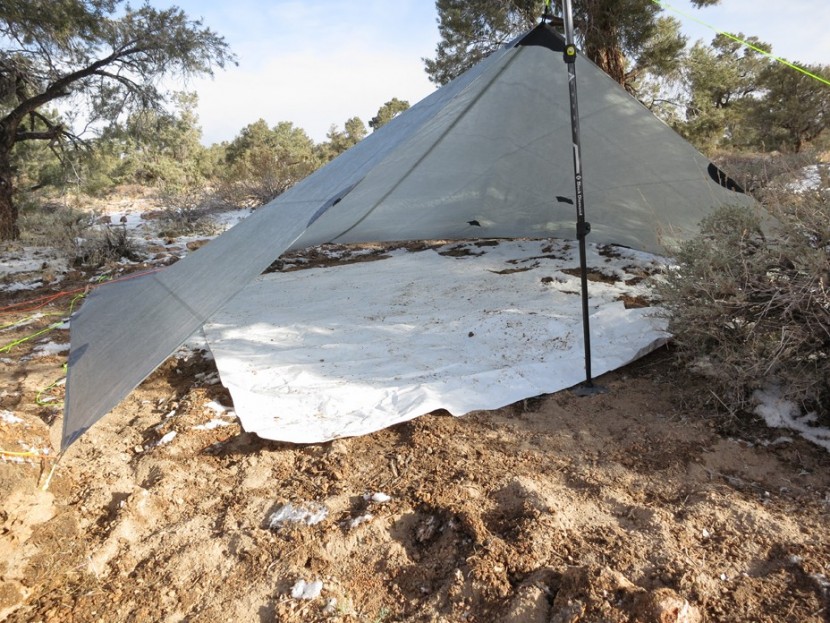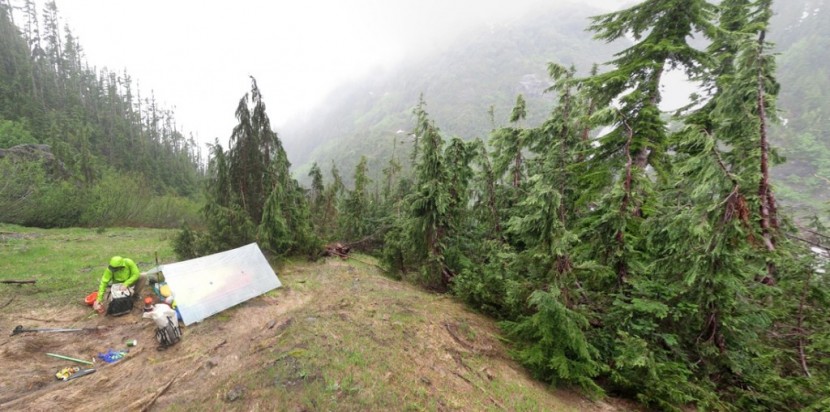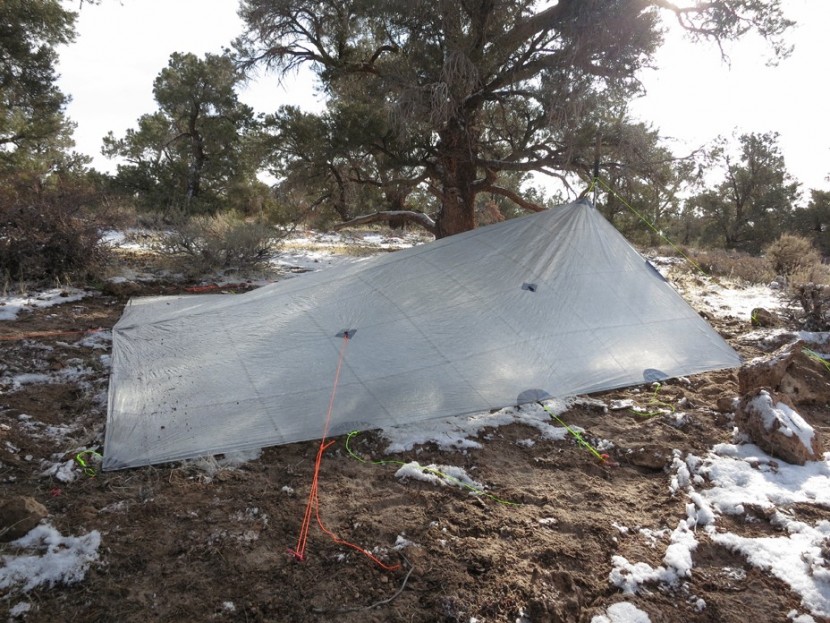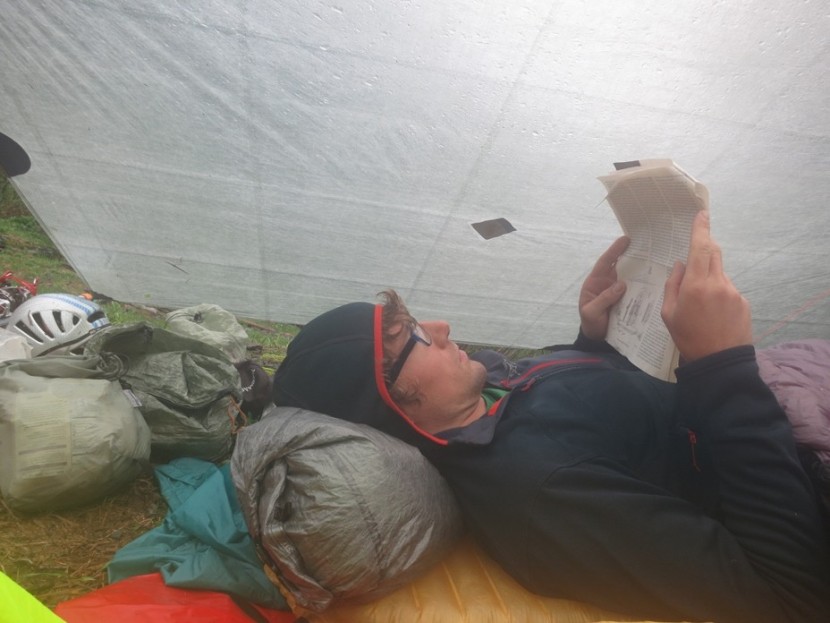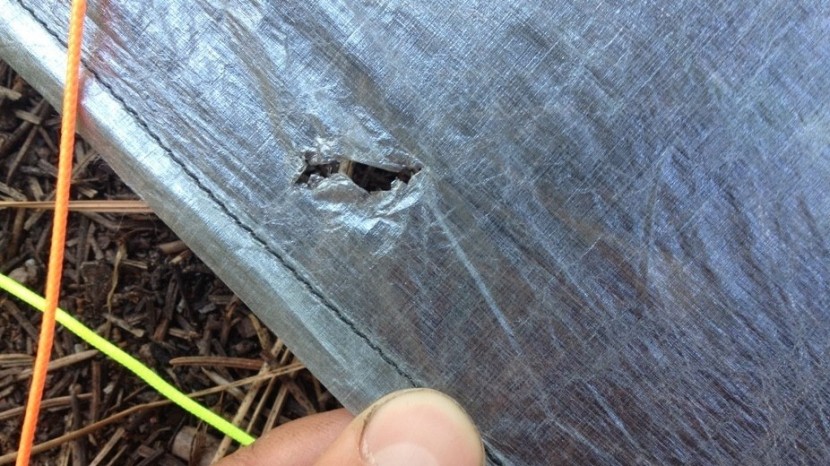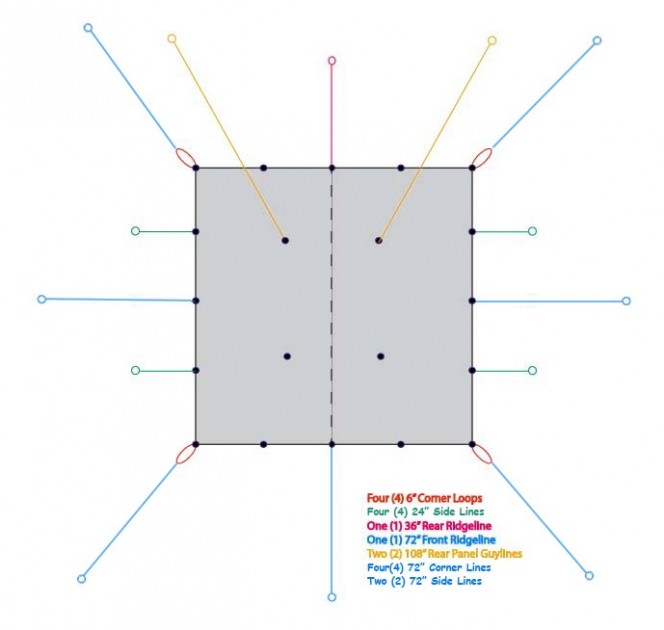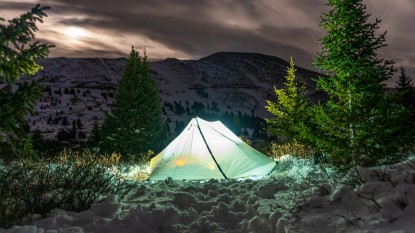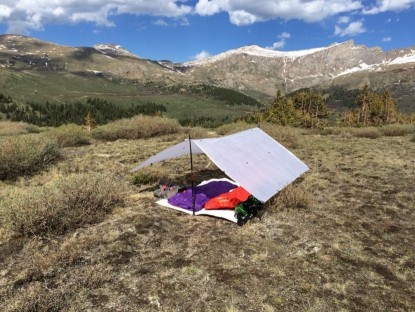Unfortunately, ordering this tarp is not convenient since it is not available from major retailers and only directly from the small manufacturer in Florida (made-to-order, involving long delays in delivery). But, if you can get past the idea of waiting for your tarp, you won't be disappointed.
Check out our favorite ultralight tents to compare all of the models tested.ZPacks Square Flat Tarp Review
Our Verdict
Our Analysis and Test Results
Ease of Set-Up
As is described in the Hyperlite Mountain Gear Square Flat Tarp Review the number and type of pitching configurations are limited only by your imagination. If pitched as an A-frame, the most common method, the tarp can go up in less than two minutes. Other configurations take different amounts of time.
Weight/Packed Size
The tarps weigh a mere 6.1 oz or 7.8 oz, with guylines. We recommend Zpacks 1.25mm Spectra Z-Line configured as shown in a diagram above (you'll need three 50 ft. lengths for $39) and will need to add extra tieouts, also shown in the diagram.
Weather Resistance
This tarp offers BOMBPROOF protection in the most serious three-season storms. In high winds, we like to pitch it in storm mode, as shown in the photo below.
For a detailed description of a flat tarp's tremendous performance in foul weather read Ryan Jordan's Tarp Camping Techniques for Inclement Conditions article from BackpackingLight.
See our Modular Accessories for Floorless Tents article for recommendations for bug protection, ground cloths, and bivys.
Livability
Comfort depends on pitching configuration. There is much more space for two people when the tarp is pitched as an A-frame than inside any other backpacking tent that weighs under 40 oz. In protected forests, you can rig the tarp up in a nearly horizontal position 3-4 ft. off the ground that provides tons of space for sitting up and sprawling.
Durability
This tarp uses the lightest and least durable cuben fiber we've tested. It is very strong when pulled horizontally but has poor puncture resistance, particularly when not under tension. Much to our surprise, a small branch from a tree fell on the edge of the tarp (an area that was not particularly taut) and punctured a hole in it!!
The good news is that cuben fiber is so strong that if it gets punctured, it is highly unlikely to tear. Field repairs are super fast with duct tape, and repair tape can make permanent repairs (the $9 ZPacks 13" x 5.25" Patch is a great value), which takes less than five minutes.
Though this tarp is not as durable as others, repairs can be made so easily and for so little cost and are so strong that we don't feel this is a significant drawback.
Adaptability
The tarp can pitch anywhere, anytime. Except for, perhaps, the top of Mt. Everest, where only one person has spent the night (in a custom tent).
Here are two examples that illustrate how the flat tarp can serve non-backpacking applications.
When ski touring in exposed areas our testers like to use flat tarps by digging a square pit several feet into the snow and pitching the tarp on top to deflect wind and spindrift; we pile snow around the edges of the tarp to create a tight seal and dig a small entrance on the leeward side. In terrible conditions, backpacks or hardshell jackets can block the entrance. When skiing in more protected areas the tarp can pitch between trekking poles as an A-frame.
For multi-day alpine rock climbs, where you bivy on the route, a flat tarp is the lightest available shelter option, and its adaptability allows it to work just about anywhere. We look for locations that make a 90-degree angle between the wall (or a boulder, or a series of rocks) and the ground and pitch the tarp using its guylines and climbing gear (no stakes). The tarp can also cover an entrance to rock caves or pitch between or over several rocks. Of course, you can also tie two ice axes together to use the tarp in storm mode if the ground is level enough.
Jens Holsten and Chad Kellog used a flat tarp (without bivy sacks) for their 7-day First Ascent of the Complete Pickets Summit Traverse in the North Cascades, WA - the most difficult alpine climb in the Lower 48, and just completed in July 2013.
Best Application
Everything.
Value
This tarp is around $100 cheaper than the Hyperlite Mountain Gear Square Flat Tarp, which we feel is a better value because it uses a more durable material and, in our opinion, is constructed even better than the ZPacks tarp.
(Though testing many Zpacks products — including sleeping bags, backpacks, stuff sacks, and shelters, we've found that their construction quality is good, but not the best, and quality control can be iffy sometimes. For example, one backpack arrived with extra bits of grosgrain that were accidentally sewn on and serve no purpose. With the Square Tarp one of the adhesive patches that covered a central tie-out point was not stuck on as well as it could have been and rain started to leak through (until we quickly patched it with another piece of adhesive tape).)
This tarp is an excellent value, and we highly recommend it if saving weight is your absolute top priority. It is the lightest tarp available and offers bombproof protection from severe storms.
Other Versions and Accessories
The tarp is available in several rectangular sizes, but we strongly recommend the 8.5 ft square size. Below are some common sizes.
6' x 9' rectangle- Cost - $190
- Weight - 4.7 oz
- 8 tie out loops default
7' x 9' rectangle
- Cost - $215
- Weight - 5.3 oz
- 8 tie out loops default
8.5' x 10' rectangle
- Cost - $255
- Weight - 6.7 oz
- 12 tie out loops default
How to Get It
This tarp is only available directly from the manufacturer, often involving a significant delay in delivery. Shop online at www.zpacks.com. Make sure to specify the number and location of tie-outs. See the diagram below for our preferred setup.



